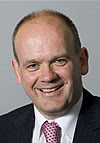
This morning Transport Commissioner Peter Hendy made his first appearance in front of our committee for some time. Unsurprisingly, the debate was wide ranging.
Olympics
Preparation for the 2012 games is foremost in the minds of TfL managers at this time. They assured us that all the capital works - London Overground, Javelin Link, Jubilee Line and DLR Extension - were completed. Efforts would now be focused on the most affected parts of Central and East London, with employers being helped to brief their staff. Tube upgrades on the Jubilee and Victoria Line would be finished and bedded in by July.
With 3,000 buses and coaches expected to converge on London the Olympic Lanes would be full. Expected crowding at Greenwich had led TfL to ask LOCOG not to issue any more tickets for the equestrian events based in Greenwich Park.
Cable thefts had affected the surface lines more than London Underground where there had only been three incidents, one on the Jubilee and two attempted thefts at the east end of the Central Line.
The committee moved on, promising to undertake a more detailed review in the run up to the games.
Buses
With 20% of the UK's bus fleet based in London, members had plenty of questions for Peter Hendy.
The challenging financial situation required a delicate balancing of subsidy, demand and km travelled. In Central London the growth in cycling had freed up spaces on the buses as passengers took to two wheels. Some services had seen their frequency reduced but so far the experience of passengers had not been affected.
The exciting new Boris Bus would be launched at Christmas with a fleet of eight prototypes being tested live on London's streets for six months, before further orders were placed.
Countdown information systems would be rolled out over six months, replacing all the current bus stop indicators and seeing an addition of 2,500 new signs at new locations.
Mr Hendy was unenthusiastic about the prospect of a 5% cut in fares at a difficult time. He declined to discuss the consequences for the bus network but would not be recommending the Mayor made such a cut, as promised by Labour candidate Ken Livingstone.
Cycling
The cycle hire scheme had experienced IT problems but the operators, SERCO, had pulled out the stops and improved performance. Bike hire and Cycle Superhighways had encouraged a growth in cycling with brand new riders taking to the saddle.
Barclays had taken something of a risk, investing two tranches of £25 million each in a scheme which had not been trialled elsewhere. Mr Hendy felt that the reward of being associated with the scheme was not disproportionate considering the balance of risks.
We briefly talked about walking. Jenny Jones urged Mr Hendy to give walking higher priority as it offered the least costly way of getting people off public transport and freeing up space for passengers.
Disabled Access
We talked about Dial a Ride, which had attracted complaints following the introduction of a new IT system. TfL were working to improve the service. I have received more complaints about ramps on buses failing to work recently. Mr Hendy reaffirmed his commitment to ensure all ramps were working before buses left the depot.
Borough Funding
The boroughs welcomed the relaxation of TfL rules on spending the money provided for Local Improvement Plans. However this is a contentious area. Jenny Jones fears that without TfL control the boroughs will ignore environmental priorities, whereas Croydon member Steve O'Connell stated that TfL should walk away entirely and leave the councils to be judged by their residents at the ballot box.
Admin Savings
Project Horizon, the TfL wide initiative to cut bureaucracy, was on course to save 20% from the budget. Mr Hendy felt this compared well with Hong Kong which was saving 15% and certainly with Paris where no savings were expected. KPMG had recently stated that TfL had adopted a culture of cost efficiency - a culture which it should always have had.

3 comments:
er: "In Central London the growth in cycling had freed up spaces on the buses as passengers took to two wheels." I would guess the growth in cycling will have freed up approximately 0.000001 % of places at best - where is the evidence for this? Or is it just a case of someone trying to suck up to Boris?
And why have you got such big gaps in your post, Roger? Sort of thing I do, glad to see not the only IT eejit writing a London blog.
Morning Mrs A. I can believe TfL's statement - the option of jumping on a Boris Bike must be quite attractive to commuters who have struggled into town on a crowded train. The bikes will get you to the office faster than the bus. That said, I still haven't chanced it myself and winter weather will make the bike a less tempting alternative.
The big gaps come with some of my photographs but not others - who knows why? 'Eejit' is a term of affection in Barnet, I assume...
Facts, Mr Evans, facts: if you are giving evidence to a committee, well, call me old fashioned, but I would expect that evidence to be backed with statistical proof. Otherwise one might be tempted just to attend and make everything up, say everything is wonderful + then go home early. Well, to be fair, that is how they do things in Barnet, but that is not really the benchmark to be aiming for.
I get mysterious gaps like these too, and they are very perplexing. I am happy to describe myself as an IT eejit, as it is true, and based on statistical evidence: see my blog for further proof.
Post a Comment